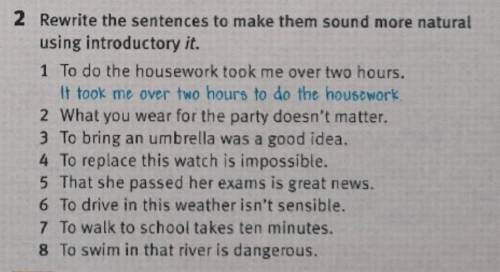Rewrite the sentences to make them sound more natural using introductory it. 1 To do the housework took me over two hours. It took me over two hours to do the housework 2 What you wear for the party doesn't matter.
3 To bring an umbrella was a good idea.
4 To replace this watch is impossible.
5 That she passed her exams is great news.
6 To drive in this weather isn't sensible.
7 To walk to school takes ten minutes.
8 To swim in that river is dangerous.

Другие вопросы по теме Английский язык
Популярные вопросы
- Площадь треугольника АВС равна 24 см^2, АВ = 6 см, AC = 8 см. Найдите...
2 - Проблеми господарського використання і заходи які вживають для збереження...
1 - Разбери слово заберут как часть речи...
3 - Чому слова :несказанна, нетлінні,повинні,зоряний,радісно,сонну,бджолинії,невблаганний,височенним....
1 - Сади осипалися милі, що чарували так мене, і знов дніпра чекають...
2 - Сила Архимеда это?? Сила тяжести?...
3 - Розгляньте портрет українського вченого. Опишіть його внесок у розвиток...
2 - Скелет выполняет … (А) и защитную функцию. Различают наружный и …(Б)...
3 - Складіть хронологічну таблицю подій у Галицько-Воолинській державі...
3 - Составьте сравнительную таблицу развитие ведущих стран европы и сша...
3
Explanation: By using "it" as an introductory word, we can rephrase the sentence to emphasize the action and make it sound more natural.
2. It doesn't matter what you wear for the party.
Explanation: By using "it" as an introductory word, we can rephrase the sentence to emphasize that the specific thing being mentioned is not important.
3. It was a good idea to bring an umbrella.
Explanation: By using "it" as an introductory word, we can rephrase the sentence to emphasize the action as a good idea.
4. It is impossible to replace this watch.
Explanation: By using "it" as an introductory word, we can rephrase the sentence to emphasize the action as being impossible.
5. It is great news that she passed her exams.
Explanation: By using "it" as an introductory word, we can rephrase the sentence to emphasize the specific information mentioned as being great news.
6. It isn't sensible to drive in this weather.
Explanation: By using "it" as an introductory word, we can rephrase the sentence to emphasize the action as being not sensible.
7. It takes ten minutes to walk to school.
Explanation: By using "it" as an introductory word, we can rephrase the sentence to emphasize the amount of time required for the action.
8. It is dangerous to swim in that river.
Explanation: By using "it" as an introductory word, we can rephrase the sentence to emphasize the action as being dangerous.